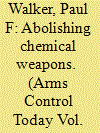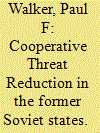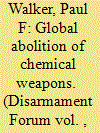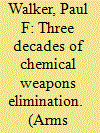|
|
|
Sort Order |
|
|
|
Items / Page
|
|
|
|
|
|
|
| Srl | Item |
| 1 |
ID:
100660


|
|
|
| 2 |
ID:
147680


|
|
|
|
|
| Summary/Abstract |
The US Cooperative Threat Reduction (CTR) program, founded in the early 1990s to secure Soviet weapons of mass destruction (WMD)—nuclear, chemical, and biological—and promote WMD nonproliferation, has enjoyed great success. CTR has spent over $10 billion in the last twenty-five years to help eliminate thousands of nuclear warheads, dozens of nuclear submarines, 35,000 metric tons of chemical agent, and thousands of strategic missiles, bombers, and missile silos in former Soviet states. But it has also been beset with numerous funding, political, bureaucratic, technical, and planning challenges. The author reviews the history of CTR funding and legislation, discusses obstacles to implementation, and identifies five broad lessons from the program's early experiences that are applicable to future global security projects.
|
|
|
|
|
|
|
|
|
|
|
|
|
|
|
|
| 3 |
ID:
127992


|
|
|
|
|
| Publication |
2012.
|
| Summary/Abstract |
In November 2012 the Organisation for the Prohibition of Chemical Weapons (OPCW) will
host its 17th annual Conference of the States Parties in The Hague to review recent progress
in the global elimination of chemical weapons. As the international implementing agency
for the Chemical Weapons Convention (CWC), the OPCW has overseen the safe and verified
demilitarization of more than 50,000t of chemical agents and almost four million weapons and
containers in six countries since the CWC's entry into force in April 1997.
This represents about 71% of the declared chemical weapons stockpiles-72,669t-in seven
possessor countries. The great bulk, 95%, of these stockpiles resided in the United States and
the Russian Federation, which had declared 28,577t and 40,000t respectively. The remaining
4,052t were declared primarily by India and the Republic of Korea, with Albania declaring 16t
and Libya 24t.
|
|
|
|
|
|
|
|
|
|
|
|
|
|
|
|
| 4 |
ID:
069567


|
|
|
| 5 |
ID:
136001


|
|
|
|
|
| Summary/Abstract |
Just one year after Syria’s formal accession to the Chemical Weapons Convention (CWC), the Organisation for the Prohibition of Chemical Weapons (OPCW), the international body responsible for implementing the treaty, announced this October that almost all of Syria’s declared chemical agents and precursor chemicals had been safely and irreversibly destroyed.[1]
Workers in protective clothing carry a dummy grenade into a bunker during a media day at the GEKA facility in Münster, Germany, on March 5. The liquid waste from the neutralization of Syrian sulfur mustard agent aboard the MV Cape Ray was brought to the GEKA facility last summer for further treatment. (Nigel Treblin/Getty Images)Workers in protective clothing carry a dummy grenade into a bunker during a media day at the GEKA facility in Münster, Germany, on March 5. The liquid waste from the neutralization of Syrian sulfur mustard agent aboard the MV Cape Ray was brought to the GEKA facility last summer for further treatment. (Nigel Treblin/Getty Images)This was an enormously ambitious and difficult effort, especially in light of the ongoing civil war in Syria, the refusal of Syria to cover the costs of demilitarization, the strong reluctance of any other country to destroy the Syrian chemical stockpile on its territory, and the ongoing allegations of continued and indiscriminate chemical weapons use against rebel forces and civilian populations in Syria
|
|
|
|
|
|
|
|
|
|
|
|
|
|
|
|
| 6 |
ID:
170693


|
|
|
|
|
|
|
|